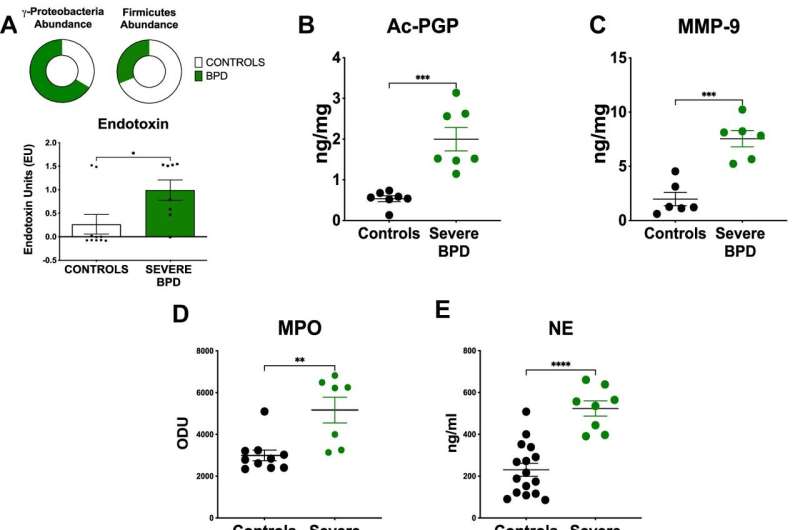This article has been reviewed according to Science X's editorial process and policies. Editors have highlighted the following attributes while ensuring the content's credibility:
fact-checked
peer-reviewed publication
trusted source
proofread
Inhalation of live Lactobacilli lessens lung inflammation and improves lung function, preclinical study finds

In recent preclinical models, the inhalation of a mixture of living Lactobacilli bacteria attenuated pulmonary inflammation and improved lung function and structure for the chronic lung diseases bronchopulmonary dysplasia and chronic obstructive pulmonary disease.
This study, published in the journal Nature Communications, determined the mechanism of this live biotherapeutic product—a powder mixture of living Lactobacilli bacteria—to reduce neutrophilic inflammation and reduce a broad swath of inflammatory markers in BPD and COPD, says Charitharth Vivek Lal, M.D., a University of Alabama at Birmingham neonatologist who co-led the research with Amit Gaggar, M.D., Ph.D., a UAB pulmonologist.
Their findings "provide a paradigm for the progression of structural lung disease," Lal said, because it identifies the Lactobacilli as critical to regulating lung protease activity that is linked to the destruction caused by matrikine generation, extracellular matrix turnover and chronic neutrophilic inflammation that damages air sacs in the lungs.
A possible protective role for Lactobacilli in the lung and the possible use of Lactobacilli to treat chronic lung disease had its foundation in 2016 when Lal and UAB colleagues discovered that the airways of infants with severe bronchopulmonary dysplasia had decreased numbers of Lactobacilli, increased numbers of proteobacteria and increased concentrations of proteobacterial endotoxin.
In this latest study, the UAB researchers provide a mechanism of action for the Lactobacilli treatment to decrease downstream disease development and showed safety and effectiveness of the live biotherapeutic treatment in a mouse pup model for BPD and three mouse models of COPD.
Bronchopulmonary dysplasia develops in some extremely premature infants after damage induced by high oxygen tension or mechanical ventilation needed to keep them alive. COPD occurs in older people, especially smokers, and kills about 130,000 Americans a year and about 3 million more worldwide.
"Inhaled live biotherapeutic products show promise in addressing common pathways of disease progression that in the future can be targeted at a variety of lung diseases," Lal said. "Preclinical animal data is suggestive, and safety of the potential drug in humans will be tested in a forthcoming clinical trial. Human adult safety data in COPD will help de-risk the pathway to approval for use of the drug in bronchopulmonary disease infants."
The UAB researchers hypothesized that mouse models of BPD would show heightened levels of acetylated proline-glycine-proline, or Ac-PGP, an extracellular matrix-derived peptide, as had been seen in premature infants with BPD.
This was demonstrated in BPD mouse models, and gain- or loss-of-function studies showed the impact of Ac-PGP. Intranasal instillation of Ac-PGP increased neutrophilic inflammation and lung degradation. When an inhibitor of Ac-PGP was given with the Ac-PGP, markers of neutrophilic inflammation decreased and lung structure improved.
Researchers then showed that a proprietary Lactobacilli blend of L. planatarum, L. acidophilus and L. rhamnosus performed best in synergy to reduce the inflammatory proteinase MMP-9, which helps release the Ac-PGP from extracellular matrix. Furthermore, supernatant from Lactobacilli growth medium also reduced MMP-9 at a similar magnitude as live Lactobacilli bacteria.
A key finding was that L(+) lactic acid, which is produced in Lactobacilli growth medium supernatant, reduced MMP-9 in vitro, showing an important role for this lactic acid as an anti-inflammatory molecule. Researchers found that live Lactobacilli in the lungs provided an ongoing, sustained release of L(+) lactic acid in a controlled and well-tolerated manner.
A major technological advance reported in the study was creating the inhaled Lactobacilli powder through particle engineering—particles small enough to reach deep into the lungs while preserving viable bacteria. This live biotherapeutic product was then tested in the BPD and COPD models. In the COPD mouse models, the blend successfully reduced inflammation in the lung microenvironment—whether treated concurrently or post-injury—showing anti-inflammatory effects, decrease of several pro-inflammatory markers and elevation of the anti-inflammatory marker IgA.
An interesting finding was the favorable performance of the live biotherapeutic product. It reduced MMP-9 and other pro-inflammatory cytokines as well as—or in some cases better than—fluticasone furoate, a United States Food and Drug Administration-approved inhaled corticosteroid found in COPD combination therapies.
Safety and biodistribution studies in one of the COPD mouse models showed that inhalation of the bacterial powder did not initiate adverse reactions or disease, and the Lactobacilli did not translocate to distal tissues or accumulate in the lungs.
Co-first authors of the study are Teodora Nicola and Nancy Wenger, UAB Department of Pediatrics, Division of Neonatology. Other authors, along with Lal, Gaggar, Nicola and Wenger, are Xin Xu, Camilla Margaroli, Kristopher Genschmer, J. Edwin Blalock, UAB Department of Medicine, Division of Pulmonary, Allergy and Critical Care Medicine; and Michael Evans, Luhua Qiao, Gabriel Rezonzew, Youfeng Yang, Tamas Jilling, Kent Willis and Namasivayam Ambalavanan, UAB Department of Pediatrics, Division of Neonatology.
More information: Teodora Nicola et al, A Lactobacilli-based inhaled live biotherapeutic product attenuates pulmonary neutrophilic inflammation, Nature Communications (2024). DOI: 10.1038/s41467-024-51169-0



















